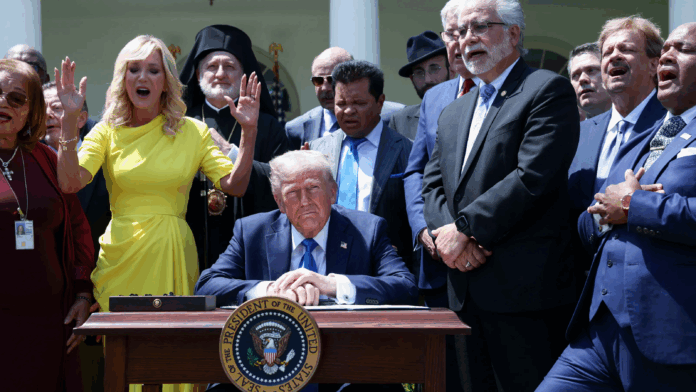Trump’s New Commission: Religious Liberty or Religious Agenda?
On May 20, 2025, MSNBC reported on the formation of former President Donald Trump’s new Religious Liberty Commission—a body that, despite its name, appears poised to undermine the very foundation of America’s secular democracy. The commission is stacked with far-right religious leaders and activists, many of whom have a long history of opposing the separation of church and state. This development raises urgent questions about the future of religious freedom, pluralism, and the constitutional principles that have long defined the United States.
In May 2025, President Donald Trump established the Religious Liberty Commission, appointing Texas Lieutenant Governor Dan Patrick as chair and Dr. Ben Carson as vice chair. The commission comprises various advisory boards, including religious leaders, legal experts, and lay leaders, tasked with evaluating threats to religious liberty in the United States. Members include prominent figures such as Cardinal Timothy Dolan, Bishop Robert Barron, and Pastor Franklin Graham.
The commission’s mandate encompasses issues like parental rights in religious education, school choice, and free speech for religious organizations. It aims to provide guidance to the White House on religious liberty policies and recommend executive or legislative actions to protect these freedoms.
Critics argue that the commission’s composition heavily favors conservative Christian perspectives, raising concerns about the erosion of the separation between church and state. The inclusion of figures like Ismail Royer and Shaykh Hamza Yusuf has sparked debate due to their controversial backgrounds, with some viewing their appointments as steps toward greater religious inclusion and others expressing concern over their past associations.
President Trump’s remarks during the commission’s announcement further fueled controversy. He questioned the importance of the separation of church and state, stating, “They say separation between church and state… I said, ‘All right, let’s forget about that for one time.'” Such statements have been met with both support from religious conservatives and criticism from advocates of secular governance.
Why Secularism Matters
The United States was founded on the principle that government should not favor any religion—or religion at all. The First Amendment’s Establishment Clause is clear: “Congress shall make no law respecting an establishment of religion, or prohibiting the free exercise thereof.” This separation is not just a legal technicality; it is a safeguard for everyone’s freedom, including religious minorities and nonbelievers.
When government bodies are filled with individuals who openly oppose this separation, the risk is not just theoretical. History shows that when religious dogma is allowed to dictate public policy, the rights of those outside the favored faith are routinely trampled. Secularism is not anti-religion; it is pro-freedom. It ensures that no single belief system can dominate the public sphere or dictate the lives of others.
Challenging Criticism of Atheism
Critics often claim that Atheism is inherently negative or lacks moral grounding. However, facts and logic tell a different story:
- Atheists can be just as ethical as religious believers. Numerous studies, including research published in Scientific American, have found no significant difference in moral behavior between atheists and the religious.
- Secular societies consistently rank higher in measures of well-being. Countries with higher rates of nonbelief, such as Sweden and Denmark, enjoy lower crime rates, higher levels of happiness, and stronger social safety nets.
The Real Threat: Erosion of Constitutional Principles
Defending the separation of church and state is not just an Atheist cause; it is an American cause. It is about ensuring that everyone, regardless of belief, can participate equally in public life. As this new commission moves forward, it is more important than ever for secular voices to be heard and for facts—not fear—to guide the national conversation.

